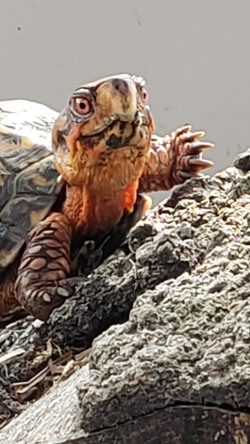
This striking individual is a charismatic and friendly fellow. Found walking along the railroad tracks in the center of Ashland VA. He was observed and picked up by a jogger who noticed that there was not any suitable habitat to be seen. As he was found not far from the small pet supply store in town, he was taken there to inquire if perhaps he was an escapee, or someone’s lost pet. The Sanctuary was called and he became one of our earliest residents.
With a little research and observation of Slash’s behaviors and habits here is what we can discern.
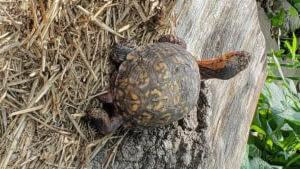
After his initial quarantine period Slash was introduced to another male. Slash was immediately aggressive and attempted to mount, bite and chase the other turtle. Eastern Box Turtles are relatively peaceful and aggression among males is usually mild. Displays of dominance usually include mounting and biting at the front edge of the shell, occasionally, the dominate male will get his rear feet stuck inside the shell of the passive turtle, not unlike mating with a female. Slash’s extreme aggression gave pause to consider that it likely had been a long time since he had seen another of his species. Slash’s acclimation was gradual and taught me that allowing a period of visual introduction with out physical contact was beneficial for reintroducing isolated turtles to their own species.
Growth Rings Tell a Story
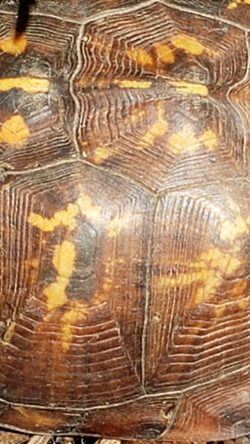
The Eastern Box turtles shell grows about 20 countable rings as they mature. They indicate health, diet, and to a degree, age. If the turtle has a good season, say with abundant food in the spring followed by a brief aestivation period during the dog days of summer, and then another period of plentiful food, two growth rings can develop in one summer, making judging age a difficult game. Abrasion also occurs during a turtles life time due to the daily grinding of digging in and out of the dirt. Slowly, like a fine sandpaper, dirt smooths away the growth rings allowing us to know that an individual with a smooth shell is a relatively old turtle.
Slashes Growth Rings Tell a Unique and Different Story.
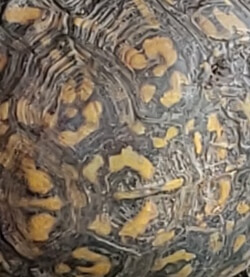
On Slashes carapace, there is an indication of an old injury, perhaps a lawn mower strike. The wound seemed to have healed during growth, indicating that he was young when injured. His growth rings also do not have the somewhat uniform, level growth of a turtle on a wild and varied diet. Although no extreme damage or pyramiding is evident in his shell, his growth rings are more prominent , and inconsistent in thickness and direction, giving him an uneven appearance, and making the sanding and smoothing of daily digging more difficult to ascertain.
So Where did Slash come from and why was he walking down Railroad Avenue?
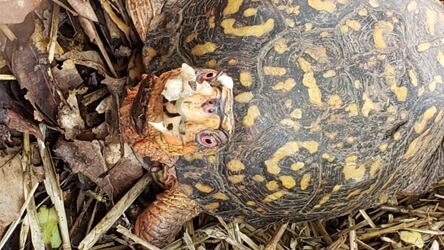
Prior to Slash’s “rescue”, an old house directly across the street from the pet supply store and facing the tracks, was auctioned off after its elderly resident moved on. The small fence that had served to keep numerous pests and wandering dogs out was soon dismantled as the new owners prepared for a total renovation. The yard had been overgrown and the remnants of an old garden still remained.
It is a possibility that our little Slash was a garden turtle. Perhaps placed in the yard at the time of his injury, isolated from his kind and fed on a diet of tomatoes, lettuce (not a good diet) and any invertebrates that he could catch. Unseen by the new owners of the old blue house, when the fence was demolished, Slash took the opportunity, like any turtle would, to explore his new “habitat”.
As recently as 30 years ago, Ashland was known for its tree lined streets, and parcels of land were still undeveloped and teemed with wildlife. There are occasional sightings of a lone box turtle wandering the neighborhood in a town that was once a swamp filled with all sorts of turtles . Unfortunately, most wooded parcels are gone, trees no longer line the streets, green spaces are mowed, and the few small parks that Ashland has left are likely unable to support a box turtle population.
We will never really know Slash’s whole story but, without a habitat to return to, he became a resident at the Box turtle Sanctuary of Virginia, where he now shares a large enclosed area with a couple other agreeable EBT males, and the sanctuaries three water turtles.
Life is good for Slash.
